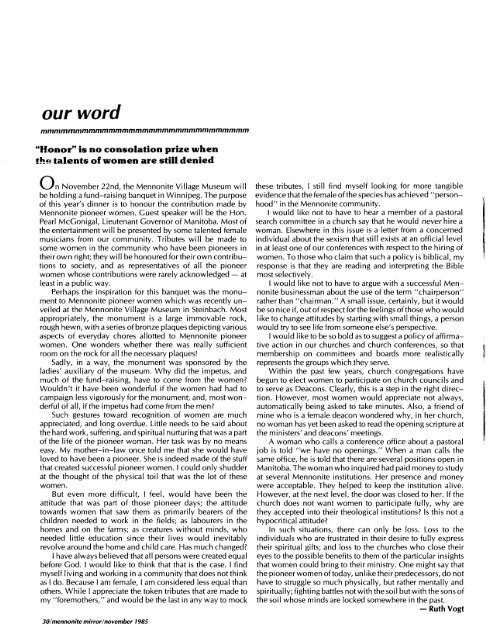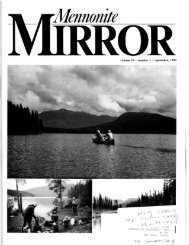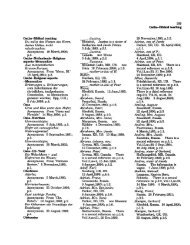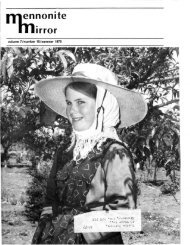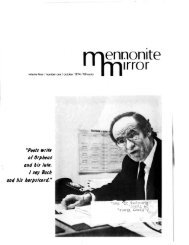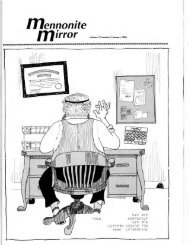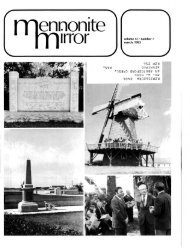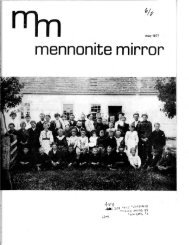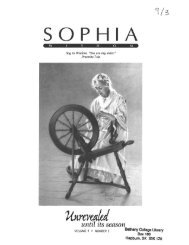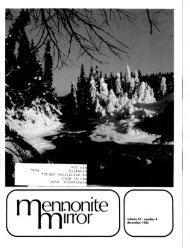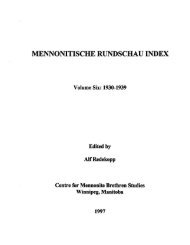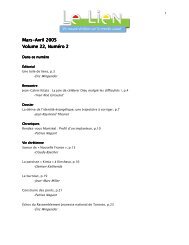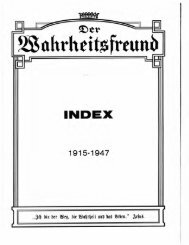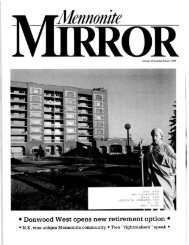No.3 - Canadian Conference of Mennonite Brethren Churches
No.3 - Canadian Conference of Mennonite Brethren Churches
No.3 - Canadian Conference of Mennonite Brethren Churches
Create successful ePaper yourself
Turn your PDF publications into a flip-book with our unique Google optimized e-Paper software.
our word<br />
mmmmmmmmmmmmmmmmmmmmmmmmmmmmmmm<br />
"Honor" is no consolation prize when<br />
the talents <strong>of</strong> women are still denied<br />
On November 22nd, the <strong>Mennonite</strong> Village Museum will<br />
be holding a fund-raising banquet in Winnipeg. The purpose<br />
<strong>of</strong> this year's dinner is to honour the contribution made by<br />
<strong>Mennonite</strong> pioneer women. Guest speaker will be the Hon.<br />
Pearl McGonigal, Lieutenant Governor <strong>of</strong> Manitoba. Most <strong>of</strong><br />
the entertainment will be presented by some talented female<br />
musicians from our community. Tributes will be made to<br />
some women in the community who have been pioneers in<br />
their own right; they will be honoured for their own contributions<br />
to society, and as representatives <strong>of</strong> all the pioneer<br />
women whose contributions were rarely acknowledged - at<br />
least in a public way.<br />
Perhaps the inspiration for this banquet was the monument<br />
to <strong>Mennonite</strong> pioneer women which was recently unveiled<br />
at the <strong>Mennonite</strong> Village Museum in Steinbach. Most<br />
appropriately, the monument is a large immovable rock,<br />
rough hewn, with a series <strong>of</strong> bronze plaques depicting various<br />
aspects <strong>of</strong> everyday chores allotted to M~nnonite pioneer<br />
women. One wonders whether there was really sufficient<br />
room on the rock for all the necessary plaques!<br />
Sadly, in a way, the monument was sponsored by the<br />
ladies' auxiliary <strong>of</strong> the museum. Why did the impetus, and<br />
much <strong>of</strong> the fund-raising, have to come from the women?<br />
Wouldn't it have been wonderful if the women had had to<br />
campaign less vigorously for the monument; and, most wonderful<br />
<strong>of</strong> all, if the impetus had come from the men?<br />
Such gestures toward recognition <strong>of</strong> women are much<br />
appreciated, and long overdue. Little needs to be said about<br />
the hard work, suffering, and spiritual nurturing that was a part<br />
<strong>of</strong> the life <strong>of</strong> the pioneer woman. Her task was by no means<br />
easy. My mother-in-law once told me that she would have<br />
loved to have been a pioneer. She is indeed made <strong>of</strong> the stuff<br />
that created successful pioneer women. I could only shudder<br />
at the thought <strong>of</strong> the physical toil that was the lot <strong>of</strong> these<br />
women.<br />
But even more difficult, I feel, would have been the<br />
attitude that was part <strong>of</strong> those pioneer days; the attitude<br />
towards women that saw them as primarily bearers <strong>of</strong> the<br />
children needed to work in the fields; as labourers in the<br />
homes and on the farms; as creatures without minds, who<br />
needed little education since their lives would inevitably<br />
revolve around the home and child care. Has much changed?<br />
I have always believed that all persons were created equal<br />
before God. I would like to think that that is the case. I find<br />
myself living and working in a community that does not think<br />
as I do. Because I am female, I am considered less equal than<br />
others. While I appreciate the token tributes that are made to<br />
my "foremothers," and would be the last in any way to mock<br />
30/mennonitemirror/novemiJer 1985<br />
these tributes, I still find myself looking for more tangible<br />
evidence that the female <strong>of</strong> the species has achieved "personhood"<br />
in the <strong>Mennonite</strong> community.<br />
I would like not to have to hear a member <strong>of</strong> a pastoral<br />
search committee in a church say that he would never hire a<br />
woman. Elsewhere in this issue is a letter from a concerned<br />
individual about the sexism that still exists at an <strong>of</strong>ficial level<br />
in at least one <strong>of</strong> our conferences with respect to the hiring <strong>of</strong><br />
women. To those who claim that such a policy is biblical, my<br />
response is that they are reading and interpreting the Bible<br />
most selectively.<br />
I would like not to have to argue with a successful <strong>Mennonite</strong><br />
businessman about the use <strong>of</strong> the term "chairperson"<br />
rather than "chairman." A small issue, certainly, but it would<br />
be so n ice if, out <strong>of</strong> respect for the feel i ngs <strong>of</strong> those who wou Id<br />
like to change attitudes by starting with small things, a person<br />
would try to see life from someone else's perspective.<br />
I would like to be so bold as to suggest a policy <strong>of</strong> affirmative<br />
action in our churches and church conferences, so that<br />
membership on committees and boards more realistically<br />
represents the groups which they serve.<br />
Within the past few years, church congregations have<br />
begun to elect women to participate on church councils and<br />
to serve as Deacons. Clearly, this is a step in the right direction.<br />
However, most women would appreciate not always,<br />
automatically being asked to take minutes. Also, a friend <strong>of</strong><br />
mine who is a female deacon wondered why, in her church,<br />
no woman has yet been asked to read the opening scripture at<br />
the ministers' and deacons' meetings.<br />
A woman who calls a conference <strong>of</strong>fice about a pastoral<br />
job is told "we have no openings." When a man calls the<br />
same <strong>of</strong>fice, he is told that there are several positions open in<br />
Manitoba. The woman who inquired had paid money to study<br />
at several <strong>Mennonite</strong> institutions. Her presence and money<br />
were acceptable. They helped to keep the institution alive.<br />
However, at the next level, the door was closed to her. If the<br />
church does not want women to participate fully, why are<br />
they accepted into their theological institutions? Is this not a<br />
hypocritical attitude?<br />
In such situations, there can only be loss. Loss to the<br />
individuals who are frustrated in their desire to fully express<br />
their spiritual gifts; and loss to the churches who close their<br />
eyes to the possible benefits to them <strong>of</strong> the particular insights<br />
that women could bring to their ministry. One might say that<br />
the pioneer women <strong>of</strong> today, unlike their predecessors, do not<br />
have to struggle so much physically, but rather mentally and<br />
spi ritually; fighti ng battles not with the soi I but with the sons <strong>of</strong><br />
the soil whose minds are locked somewhere in the past.<br />
-RuthVogt


